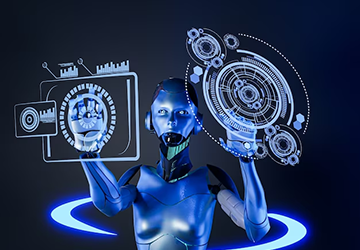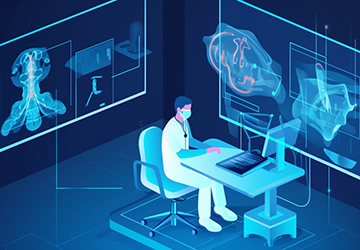One of the most fascinating AI Trends in 2023 is the growing influence of autonomous systems in daily life. Whether it is autonomous vehicles or automated supply chain management, the scope of autonomy is expanding rapidly. The key driver here is not just the capability of AI to handle complex tasks but also its ability to learn and adapt in real-time, significantly reducing human intervention; this increases efficiency and could minimize human error, offering a safer and more streamlined way to manage everything from traffic to logistics.

The Future of Artificial Intelligence holds a promise to revolutionize human-machine interaction. With advancements in Natural Language Understanding (NLU), AI systems are becoming increasingly proficient at understanding the nuances of human language; this involves a more profound comprehension of sentiment, context, and intent rather than just parsing words and sentences. As NLU becomes more refined, it opens up myriad applications, including more sophisticated virtual assistants and intuitive search algorithms.
As we move towards an era of increasingly automated decision-making processes, there's growing scrutiny over the ethical implications. The Upcoming AI Technologies are pushing the boundaries of machine capabilities and raising valid concerns about accountability and bias. For instance, who is responsible when an AI healthcare diagnostic tool makes an incorrect recommendation? Ethical considerations like these will increasingly become a focal point for AI researchers, developers, and policymakers.
One of the most electrifying AI Trends in 2023 is the union of artificial intelligence and quantum computing. Quantum computers, with their enormous computational power, can solve complex algorithms in seconds, which traditional computers might take years to crack; this has significant implications for the Future of Artificial Intelligence in fields that require heavy data computation, such as cryptography or complex simulations in climate science and medicine.
As cybersecurity threats become more advanced, the role of AI in protecting digital assets becomes even more crucial. The Future of Artificial Intelligence in cybersecurity lies in its ability to instantly detect, analyze, and respond to various security incidents. Its real-time analysis capability makes it possible to spot trends and predict potential threats, offering a proactive approach to security.
Edge AI is setting the stage to become one of the biggest AI Trends in 2023. Unlike traditional cloud-based systems, Edge AI brings data processing closer to the location where it is needed, like on local servers or even on the actual devices themselves. It drastically reduces latency times, making real-time data analysis not just a possibility but a reality. In industries like manufacturing and agriculture, the Future of Artificial Intelligence through Edge AI could mean faster, more efficient systems that can operate seamlessly, even in remote or hard-to-reach areas.
When it comes to healthcare, AI is breaking new ground. With machine learning algorithms, healthcare professionals can offer personalized medicine tailored to an individual's genetic makeup. Imagine a world where treatments and medication are specially designed for you; this increases the efficacy of treatments and could significantly reduce side effects and recovery times, making it a pivotal focus in Upcoming AI Technologies.

The realms of art, literature, and even journalism are no longer solely human domains. AI algorithms can create artwork and compose music, effectively extending the boundaries of creativity. What's interesting to consider in the Future of Artificial Intelligence is how human artists collaborate with AI to create hybrid art forms that could be more intricate and perhaps even more meaningful.
Robots are no longer just programmable units; they can learn and adapt to their environment; this is yet another significant development for AI Trends 2023. Whether in healthcare, where robots can assist in surgeries, or in hospitality, where they can serve as hotel concierges, robots with learning capabilities will revolutionize how we think about machinery and human-robot interaction.
Data privacy is a significant concern in the digital age, and this is where federated learning, an Upcoming AI Technology, comes in. Instead of transferring data to a central server for analysis, federated learning brings the algorithms to the data source; this is a radical step towards ensuring data privacy while still reaping the benefits of machine learning.
Another transformative arena for AI in 2023 is Sustainable AI, an Upcoming AI Technology focused on making artificial intelligence more eco-friendly. As machine learning models become increasingly complex, they consume vast amounts of energy, raising valid concerns about their environmental impact. Sustainable AI aims to address this by optimizing algorithms for lower power consumption, utilizing renewable energy sources for data centres, and even creating AI models that can predict and optimize energy usage in various sectors. This emphasis on sustainability resonates with growing global eco-consciousness. It marks a pivotal chapter in the Future of Artificial Intelligence, advocating for more innovation and responsibility.
Undoubtedly, the Future of Artificial Intelligence holds promise and challenges that we have yet to understand fully. The unprecedented rate of innovation and the widening scope of AI's applicability are revolutionary. Whether it's the integration of AI in traditional sectors or the ethical considerations that come with it, understanding the AI Trends 2023 is crucial for anyone who wants to be ahead in this rapidly evolving field. The landscape is complex but incredibly promising, from autonomous systems to ethical decision-making. As AI grows, it will inevitably become an integral part of our daily lives, influencing how we work, interact, and think. Therefore, staying abreast of the latest AI Trends in 2023 is beneficial and essential for anyone looking to understand the modern world.